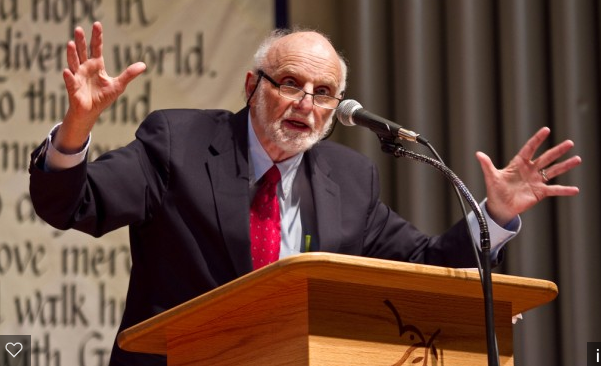Walter Brueggemann. God, Neighbor, Empire: The Excess of Divine Fidelity and the Command of Common Good. Waco: Baylor University Press, 2016.
Chapter Three: Grace: The Inexplicable Reach Beyond (71–106)
In discussing the biblical presentation of grace, Walter Brueggemann begins with a discussion of “common theology.” Drawn from a 1952 article by Morton Smith, six characteristics of ancient Near Eastern religious thought are listed briefly:
- One high god in a world of many gods.
- The one high god is effective in every aspect of life.
- The one high god is represented in symbols of power.
- The one high god punishes those who offend his will, and rewards those who comply.
- The relations of the one high god to the people are “essentially contractual.”
- There are prophets who announce appropriate punishments and rewards.
It has been suggested that these aspects of “common theology” are prevalent in the Old Testament text, and Brueggemann is able to locate three broad areas of thought where this may well be the case (72–76). However, he also sees that the biblical portrait of Yhwh goes beyond the common theology of the day, at times even at great contrast.
The opening section of this chapter is more technical and academic than the rest of the book, but demonstrates the power of religious belief (the common theology) and its potential to secure power and control over peoples and nations. That is to say, the ability to ‘control the Torah’ can yield significant influence over society. Although the common theology promised abundance to those who would adhere to Torah, the story of Israel told of a God who came to meet his people in the desert wilderness – an act of grace that broke through the “quid pro quo assumptions of covenantal, prophetic, and sapiential symmetry” (79)
This Yhwh God moves out of divine fidelity, not as a result of appeasement. This Yhwh God interacts with his people and gives them the opportunity to decide for obedience, even if the long history is one of failure (80). And, for Israel to make this return is for them to both hear and heed (Deuteronomy 4:29–30), embarking on a future of Torah obedience and restoration (80–81).
Turning to Ezekiel, Brueggemann illustrates how this biblical portrait of grace emerges. In reference to King Jehoiachin the prophet emphasizes Yhwh’s desire for righteousness, even when it pushes against the demands of law and the expectations of common theology. The biblical portrait is unique: “This is not a God who wants to operate within the heaven sanctions of common theology. This is an uncommon God who wills an uncommon possibility for an uncommon people” (83).
And so these characteristics of God, going beyond the common theology, are part of the picture that is found in Israel’s narrative. There is an emphasis on Yhwh’s forgiveness, and this is portrayed as an outworking of Yhwh’s justice: “The justice of Yhwh is not about common quid pro quo. Covenantal justice operates with a surplus grounded in abundant generosity” (84). This notion of forgiveness is at the heart of God’s activity among his people: “This is the deepest, fullest disclosure of God’s capacity and God’s intention” (88).
What is more, this God demonstrates grace and generosity in becoming an active agent “who does not wait for Israel’s return … but reaches out beyond the symmetry of common theology for restored relationship” (86).
One particular fascinating portion of this chapter is Israel’s recognition that this is not only a God of second chances, but also a God of first chances (94f.). Here is a perspective that has its origins in Israel’s monotheism – that the world itself did not exist on its own, nor did the people of God (or humanity in general); God’s grace is found in his willingness to create and sustain this world.
Out of this justice becomes linked to generosity in relationships (100):
- Isaiah 56:7–8: when God regathers his people, he welcomes the outsider as well.
- Isaiah 58:6–7: a catalogue of the excluded who are now included (cf. Matthew 25:34–36).
- Isaiah 61:1–4: “It is that the wind of the Lord God who blows to a new vocation and to a new historical possibility … those who follow the lead of the wind will transform society” (102).
This is a sketch of Israel’s understanding of grace as it relates to a world of justice. It is a portrayal of a God who displays generosity rather than reciprocity, who goes beyond our understanding of law and theology to achieve a restoring relationship with his people – both the covenantal insider and those who are presently excluded. Turning briefly to Deuteronomy 10:17–19, three specifics emerge as “the imperatives of divine grace”: a) reach for the neighbor, b) reach for the stranger, and c) reach for the enemy (105).
And yet, these three imperatives also show that the people of God themselves are to replicate this divine activity – recipients of God’s grace now sharing God’s grace: a) love the neighbor (Leviticus 19:17–18), b) love the stranger (Leviticus 19:33–35), and c) love your enemy (“Ancient Israel does not quite reach there; that reach is the verdict of the later Sermon on the Mount (Matthew 5:43–48)” (106)).
The summons to generosity in justice and righteousness is found in the very character of Yhwh. What this requires for those who will receive and replicate this grace is to go beyond policy for the sake of enacting righteousness into the neighborhood.






